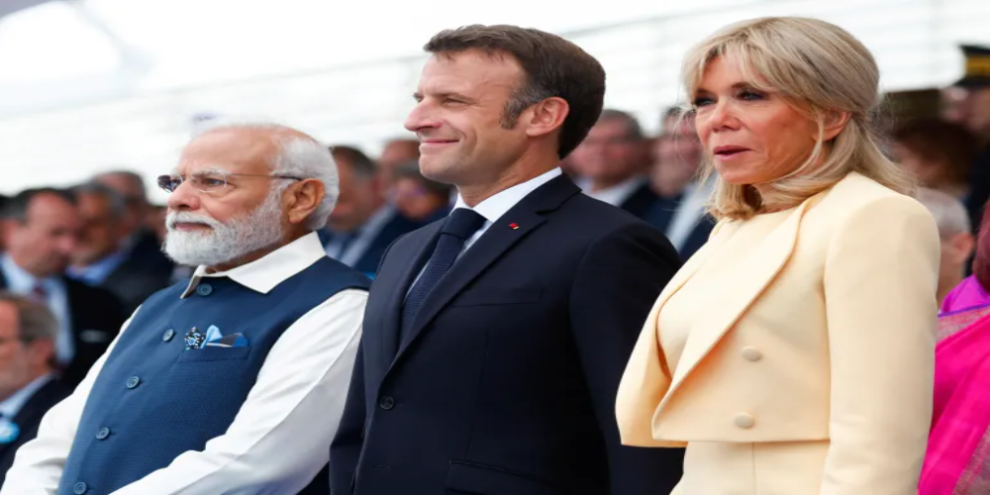Indian leader also awarded the French government’s highest honour in a visit marked by high-profile defence deals.
Indian Prime Minister Narendra Modi has been treated to one of France’s most spectacular accolades as guest of honour at the Bastille Day military parade, part of a visit that has sealed high-profile defence deals.
Modi and President Emmanuel Macron on Friday watched French and Indian soldiers march down the tree-lined Champs Elysees avenue in Paris, while French-made Rafale fighter jets India bought in 2015 took part in a flypast over the Arc de Triomphe.
Bastille Day commemorates the day in 1789 that French citizens stormed the Bastille fortress, which was used to detain prisoners and had become a symbol of the harsh rule of the French monarchy.
The national celebrations come at a delicate time for Macron, who was also booed by some members of the public as he drove down the Champs Elysees in a military car. His decision to raise the retirement age sparked months of protests this spring and has hurt his popularity ratings.
Modi began a two-day visit to Paris on Thursday, when he was granted the Legion of Honour, France’s highest award.
“It is with great humility that I accept the Grand Cross of the Legion of Honor. This is an honour for the 140 crore [1.4 billion] people of India,” the 72-year-old Indian leader posted on Twitter.
“[India] is a giant in the history of the world which will have a determining role in our future,” Macron said in a speech late on Thursday. “It is also a strategic partner and a friend.”
The Indian defence ministry on Thursday gave initial approval to buy an extra 26 French-made Rafale jets for its navy and three Scorpene-class submarines, deepening defence ties with Paris at a time the two nations are seeking allies in the Indo-Pacific.
The total value of the purchases is expected to be around $9.75bn, according to a source familiar with the details, although that was still subject to negotiations, the Reuters news agency reported.
Despite differences over Russia’s invasion of Ukraine, Western nations, including the United States, have been courting Modi and India as a military and economic counterweight to China.
France has been one of India’s closest partners in Europe for decades. It was the only Western nation not to impose sanctions on New Delhi after India conducted nuclear tests in 1998.
India has relied on French fighter jets for four decades now. Before buying Dassault Aviation’s Rafale, India bought Mirage jets in the 1980s and those still comprise two squadrons of the air force.
The ageing fleet of India’s Russian-made planes, Moscow’s inability to perform maintenance work, and delays in India’s indigenous manufacturing plans have led to the two new defence deals.
Later on Friday, Macron will host Modi at the Elysee Palace for talks before a state banquet at the Louvre Museum.
‘Disastrous signal’
But Modi’s visit has been criticised by human rights organisations concerned about the perceived growing authoritarian nature of Modi’s Hindu nationalist Bharatiya Janata Party (BJP) and accusations of discrimination against minorities, mainly the Muslims.
“Today, Emmanuel Macron rolls out the red carpet for Narendra Modi,” the French Ligue des Droits de l’Homme (LDH) rights group said on Twitter. “The LDH, concerned about India’s authoritarian turn, denounces this invitation which sends a disastrous signal, negating our democratic values.”
Ahead of Modi’s visit, Human Rights Watch said it was “deeply concerning” that France should celebrate the idea of equality and liberty with “a leader whom many criticise for undermining democracy in India”.
Modi’s government has been accused of passing anti-Muslim legislation and implementing anti-Muslim policies since it came to power in 2014. That includes a law on citizenship and the end of the special status of Indian-administered Kashmir, India’s only Muslim-majority region, in 2019.
The United Nations human rights office described the citizenship law as “fundamentally discriminatory” for excluding Muslim migrants.
But for France, the strategic partnership with India is crucial as it seeks to consolidate its alliance network in the Indo-Pacific region after being dealt a blow by Australia when Canberra decided to ditch a big French submarine contract and form the AUKUS alliance with the UK and the US.
Both India and France, through its island territories, have deep interests in the Indian Ocean and are concerned about China’s growing assertiveness in the region.
Source : Al Jazeera
















